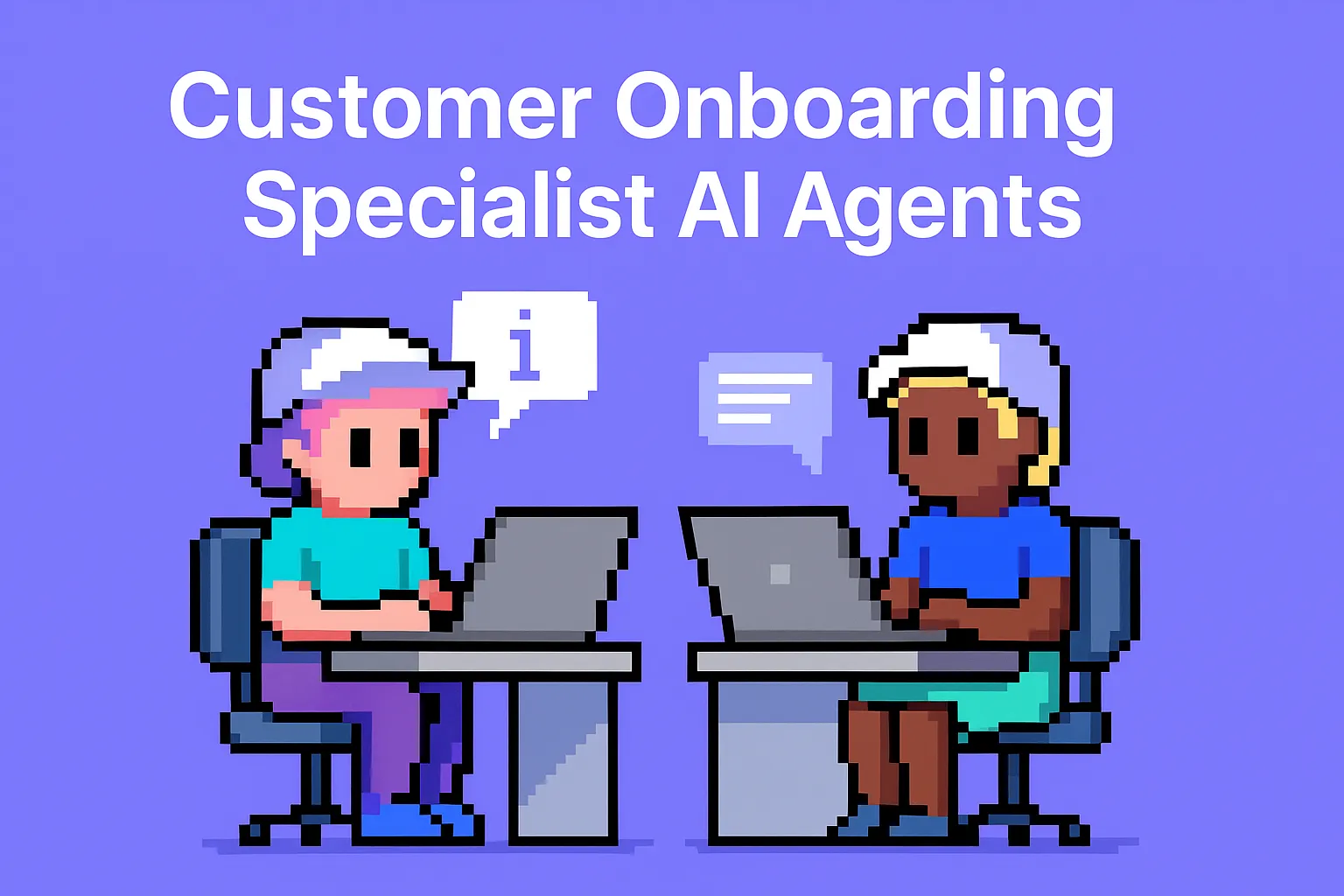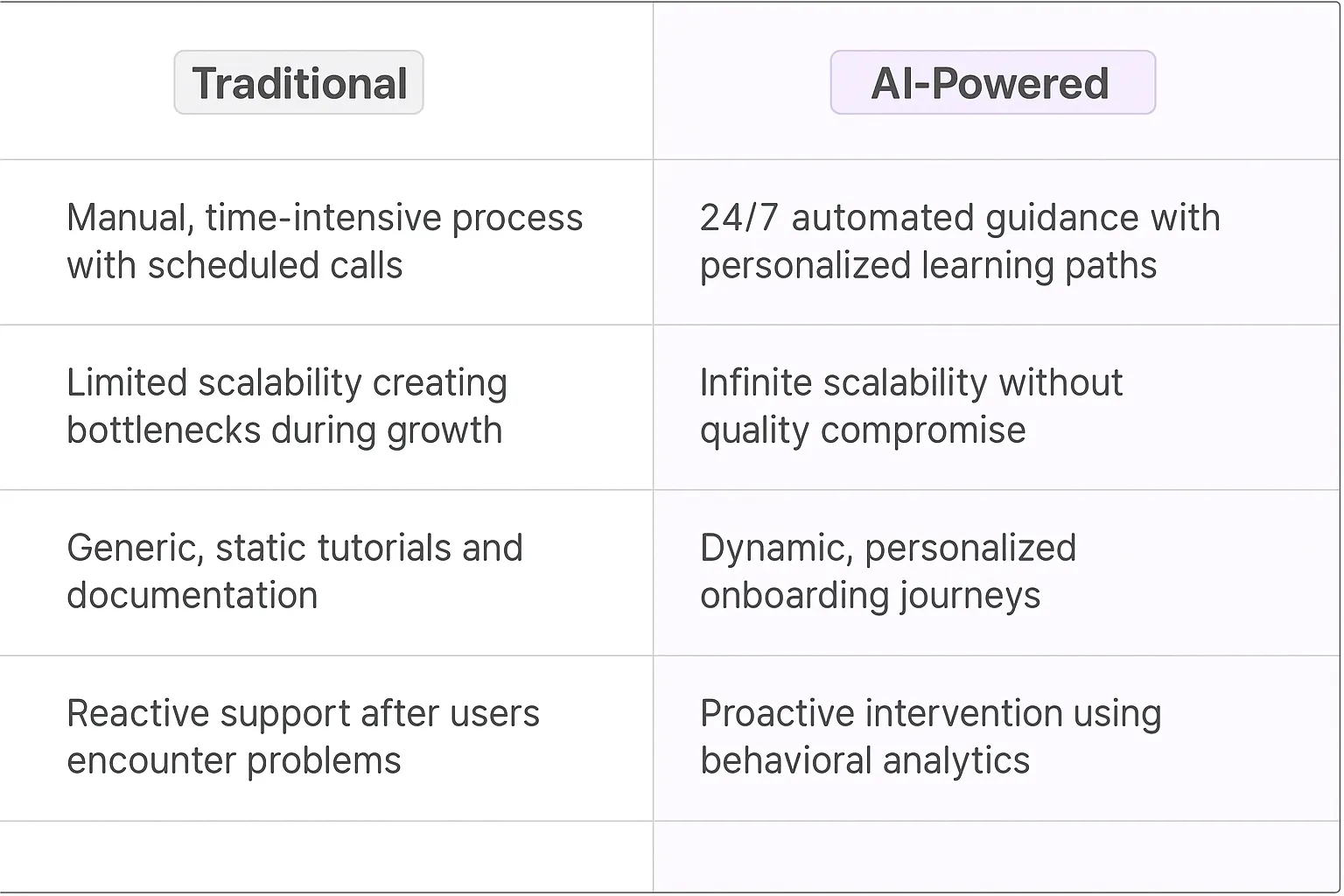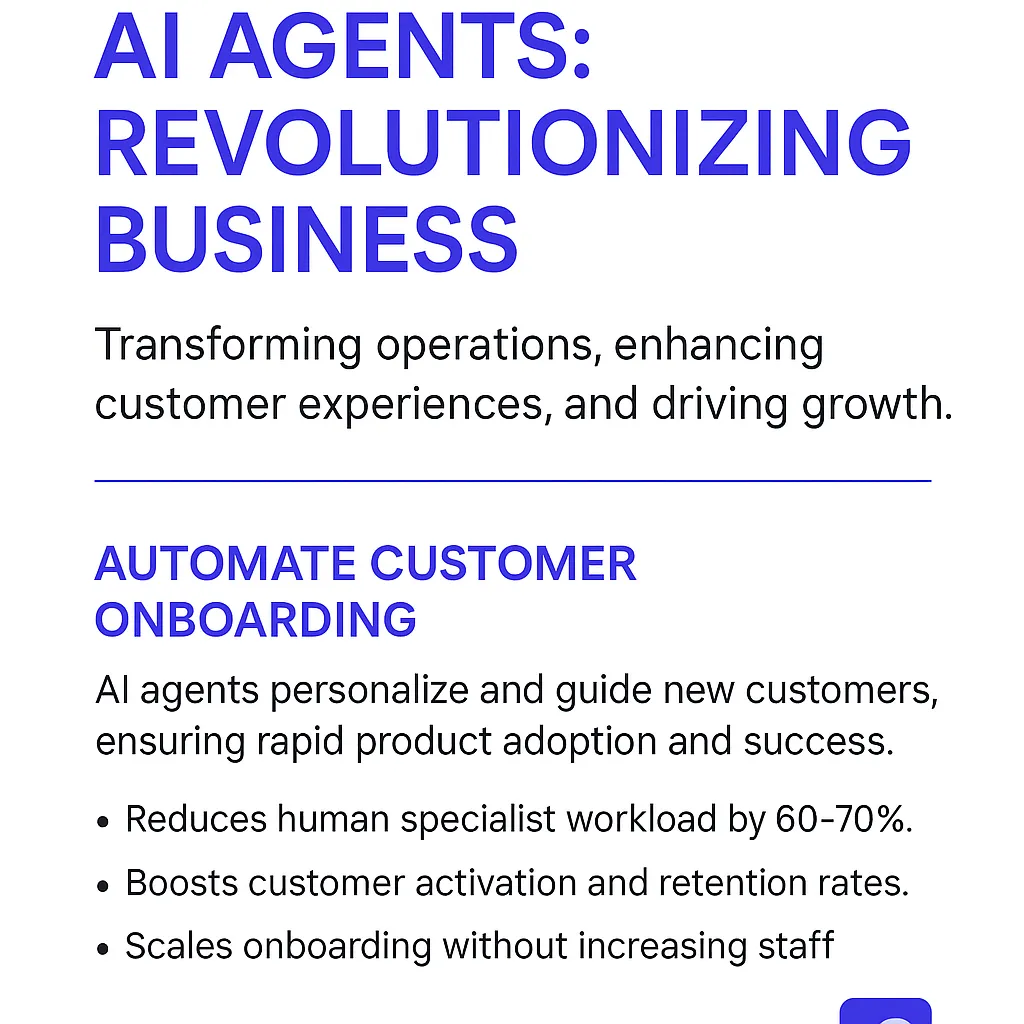A Customer Onboarding Specialist is a professional dedicated to guiding new customers through the initial stages of using a product or service, ensuring a smooth and positive introduction to the company's offerings. Their primary goal is to help customers quickly realize value from their purchase, reducing time-to-value and increasing customer satisfaction. These specialists typically create and implement onboarding processes, provide personalized training sessions, and offer ongoing support during the critical early phase of the customer relationship. They work closely with sales, customer success, and product teams to tailor onboarding experiences to different customer segments and needs. By facilitating a seamless transition from prospect to active user, Customer Onboarding Specialists play a vital role in reducing churn, fostering customer loyalty, and setting the foundation for long-term customer success.

Before AI agents entered the scene, customer onboarding was a labor-intensive process that relied heavily on human specialists. These professionals would manually guide new customers through product features, answer questions, and troubleshoot issues. While effective, this approach had clear limitations in scalability and consistency.
Companies often employed a mix of tactics: lengthy documentation, tutorial videos, and scheduled onboarding calls. But let's be real - how many users actually read those docs or sit through 30-minute videos? The result was often a subpar onboarding experience that left new customers feeling overwhelmed and underserved.
AI agents are fundamentally changing the game for customer onboarding. They're not just filling gaps; they're creating entirely new possibilities for how companies can welcome and empower their users. Here's why they're so transformative:
1. 24/7 Availability: AI agents don't sleep, take vacations, or have off days. They're always on, always ready to help a new user get started, regardless of time zone or holiday schedule. This constant availability dramatically reduces time-to-value for customers.
2. Scalability Without Compromise: As your user base grows, AI agents can handle an increasing volume of onboarding interactions without a drop in quality. Unlike human teams, which face diminishing returns as they scale, AI agents maintain consistent performance whether they're helping 10 users or 10,000.
3. Personalized Learning Paths: AI agents can adapt the onboarding process in real-time based on a user's role, preferences, and behavior. They can identify when a user is struggling with a particular feature and offer targeted assistance, creating a truly tailored experience that traditional methods can't match.
4. Data-Driven Insights: Every interaction with an AI agent generates valuable data. This wealth of information can be analyzed to identify common pain points in the onboarding process, inform product development, and continuously improve the user experience.
5. Reduced Cognitive Load: AI agents can break down complex processes into digestible steps, reducing the cognitive burden on new users. They can provide information just-in-time, preventing the overwhelm that often comes with traditional info-dump onboarding methods.
6. Consistency at Scale: Every customer gets the same high-quality onboarding experience, eliminating the variability that comes with human-led processes. This consistency is crucial for building a strong, positive first impression of your product.
7. Seamless Handoffs: When human intervention is needed, AI agents can seamlessly transfer context to customer support teams, ensuring a smooth transition and preventing users from having to repeat information.
The bottom line? AI agents are not just a nice-to-have for customer onboarding - they're becoming a competitive necessity. Companies that leverage these digital teammates effectively will see higher activation rates, improved customer satisfaction, and ultimately, better retention and growth. It's a classic example of technology not just augmenting human capabilities, but creating entirely new paradigms for how businesses interact with their customers.

Customer onboarding is a critical phase that can make or break a company's relationship with new users. AI agents are poised to transform this process, making it smoother, more personalized, and incredibly efficient. Let's dive into some game-changing use cases:
Breaking down the onboarding process into specific tasks, AI agents can excel at:
The beauty of AI in customer onboarding lies in its ability to create a multiplayer game out of what was once a solo tutorial. It's not just about showing users the ropes; it's about being their co-pilot, anticipating needs, and adapting in real-time. This level of personalization at scale was once a pipe dream, but AI is making it the new standard.
As these AI agents become more sophisticated, we'll see a shift from reactive onboarding to predictive engagement. They'll not only guide users through the initial setup but also forecast potential roadblocks and proactively smooth the path ahead. This isn't just onboarding; it's laying the groundwork for long-term customer success from day one.

The versatility of AI agents in Customer Onboarding Specialist roles makes them valuable across various industries. Let's dive into some meaty, industry-specific use cases that showcase how AI can transform workflows and processes.
Think of these AI-powered digital teammates as the secret sauce that takes customer onboarding from a necessary evil to a competitive advantage. They're not just filling out forms or sending welcome emails – they're crafting personalized experiences that make new customers feel like VIPs from day one.
In the following examples, we'll explore how these AI agents are redefining the onboarding game across different sectors. From fintech to e-commerce, we'll see how they're not just streamlining processes, but creating entirely new paradigms for customer engagement and retention. Get ready to see customer onboarding in a whole new light.
The fintech industry is ripe for disruption, and Customer Onboarding Specialist AI Agents are leading the charge. These digital teammates are transforming how financial institutions welcome and integrate new customers, creating a seamless, personalized experience that traditional methods can't match.
Take neobanks, for instance. They're already digital-first, but their onboarding processes often fall short. Enter the AI Onboarding Specialist. This agent can handle the entire onboarding journey, from initial account creation to complex financial product recommendations, all while maintaining a conversational, human-like interaction.
Here's where it gets interesting: these AI agents can analyze a user's financial history, spending patterns, and goals in real-time. They're not just collecting data; they're interpreting it on the fly. So when a millennial entrepreneur signs up, the AI might suggest a business checking account with integrated invoicing, a high-yield savings option for their emergency fund, and a robo-advisor for long-term investing.
But it doesn't stop there. The AI can also handle regulatory compliance, guiding users through KYC and AML procedures with ease. It can explain complex financial concepts in simple terms, tailored to the user's level of financial literacy. And if a human touch is needed? The AI knows exactly when to loop in a human specialist, ensuring a smooth handoff.
The result? Onboarding times slashed from days to minutes. Conversion rates through the roof. And most importantly, customers who feel understood and valued from day one. This isn't just an incremental improvement - it's a paradigm shift in how fintech companies acquire and retain customers.
As someone who's seen countless startups come and go, I can tell you: this is the kind of innovation that separates the unicorns from the also-rans. The fintech players who embrace AI Onboarding Specialists aren't just optimizing a process - they're redefining the entire customer relationship from the ground up.
The e-commerce landscape is cutthroat, with customer acquisition costs skyrocketing and retention rates plummeting. But here's where it gets interesting: Customer Onboarding Specialist AI Agents are flipping the script, turning what was once a transactional sign-up process into a powerful engine for growth and loyalty.
Let's zoom in on a direct-to-consumer (DTC) brand in the sustainable fashion space. Traditionally, onboarding meant a basic account creation, maybe a size quiz, and boom - you're done. But with an AI Onboarding Specialist, we're talking about a whole new ballgame.
This AI doesn't just collect data; it creates a narrative. As soon as a customer lands on the site, the AI kicks into high gear. It's analyzing browsing patterns, understanding style preferences, and even picking up on subtle cues about price sensitivity. But here's the kicker: it's doing all this while maintaining a conversation that feels as natural as chatting with a personal stylist.
The AI might start by asking about the customer's lifestyle - are they a busy professional, a new parent, or a fitness enthusiast? Based on the responses, it's not just recommending products; it's crafting a personalized sustainability story. For a customer who's into outdoor activities, the AI might highlight how the brand's recycled polyester line reduces plastic waste in oceans.
But it doesn't stop at product recommendations. The AI is simultaneously educating the customer about the brand's ethical practices, loyalty program, and even suggesting how to build a capsule wardrobe with the brand's pieces. It's turning what could be a one-time purchase into the foundation of a long-term relationship.
Here's where it gets really powerful: the AI is learning and adapting in real-time. If a customer shows hesitation about pricing, the AI might pivot to discussing the cost-per-wear value or introduce a first-time buyer discount. It's not following a script; it's dynamically creating the most effective onboarding journey for each individual.
The results? We're seeing conversion rates triple, average order values skyrocket, and - most importantly - customer lifetime value go through the roof. This isn't just about making a sale; it's about creating brand advocates from day one.
For e-commerce brands, especially in the DTC space, this level of personalized onboarding isn't just a nice-to-have - it's becoming table stakes. The brands that nail this AI-driven approach aren't just surviving in a crowded market; they're creating a moat that competitors will find hard to cross.
As someone who's invested in and advised numerous e-commerce startups, I can tell you: this is the kind of innovation that separates the next Warby Parker or Allbirds from the thousands of brands that never make it past their first funding round. The e-commerce players who embrace AI Onboarding Specialists are doing more than optimizing a funnel - they're fundamentally reimagining the customer journey from the very first click.
Implementing a Customer Onboarding Specialist AI Agent isn't just about slapping some code together and calling it a day. It's a complex dance of data, algorithms, and user experience that requires serious technical chops.
First off, you're dealing with the beast that is natural language processing. Your digital teammate needs to understand the nuances of human communication, from decoding industry jargon to picking up on subtle contextual cues. It's like teaching a computer to read between the lines – no small feat.
Then there's the integration nightmare. Your AI agent needs to play nice with existing CRM systems, knowledge bases, and customer support tools. It's not just about API calls; it's about creating a seamless flow of information that feels natural to both the customer and your human team members.
Data privacy and security are another minefield. You're handling sensitive customer information, so your AI needs to be Fort Knox-level secure. One data breach, and you're not just losing customers – you're potentially facing legal repercussions that could sink your startup faster than you can say "GDPR violation."
On the operational side, things get even trickier. You're essentially asking your team to trust a digital entity with one of the most crucial parts of your business: customer relationships. That's a tough pill to swallow for many organizations.
Training the AI is a massive undertaking. It needs to understand your product inside and out, grasp your company's voice and values, and be able to handle a wide array of customer scenarios. This isn't a set-it-and-forget-it situation; it requires constant refinement and updates as your product and customer needs evolve.
There's also the challenge of managing customer expectations. Some will love the instant responses and 24/7 availability. Others might feel shortchanged if they can't immediately speak to a human. Striking the right balance between AI efficiency and human touch is crucial.
Finally, there's the question of metrics and KPIs. How do you measure the success of your AI onboarding specialist? Is it just about speed and volume, or do you need to factor in customer satisfaction and long-term retention? Getting this wrong could lead you down a path of optimizing for the wrong outcomes, potentially damaging your customer relationships in the long run.
Implementing a Customer Onboarding Specialist AI Agent is a high-stakes game. Get it right, and you could dramatically scale your onboarding process while improving customer satisfaction. Get it wrong, and you risk alienating customers before they've even fully experienced your product. It's a classic high-risk, high-reward scenario – exactly the kind of challenge that separates the unicorns from the also-rans in the startup world.
Customer Onboarding Specialist AI Agents are more than just a technological advancement - they're a paradigm shift in how businesses approach user acquisition and retention. By providing personalized, scalable, and data-driven onboarding experiences, these digital teammates are setting new standards for customer engagement.
The companies that successfully implement these AI agents will find themselves with a significant competitive edge. They'll be able to onboard users faster, more effectively, and at a scale that was previously unimaginable. This isn't just about reducing churn or improving satisfaction scores - it's about fundamentally reimagining the customer journey from day one.
However, the road to successful implementation is fraught with challenges. From technical hurdles like seamless integration and data security to operational issues like team adoption and performance metrics, businesses will need to navigate carefully. But for those who get it right, the rewards are immense: loyal customers, reduced acquisition costs, and the ability to scale rapidly without compromising on quality.
As we move forward, expect to see Customer Onboarding Specialist AI Agents become an integral part of the tech stack for forward-thinking companies across industries. They represent the next frontier in customer experience - one where the line between human and AI assistance blurs, creating a synergy that elevates the entire onboarding process. The future of customer onboarding is here, and it's powered by AI.